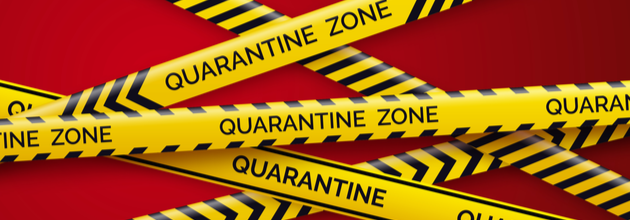 | Read in Browser |
 |
 |
| | Top News  Shutterstock The Centers for Disease Control and Prevention is updating recommendations for COVID-19 control, shortening isolation restrictions from 10 to five days for all Americans who test positive for the virus. That's as long as they are asymptomatic, though they should still wear a mask around others for a further five days. The newly-issued guidance is in line with the growing evidence suggesting that people infected with COVID-19 are most infectious 1–2 days before and 2–3 days after the onset of symptoms.
In addition: The CDC has endorsed a shorter quarantine period for the close contacts exposed to the virus. "For people who are unvaccinated or are more than six months out from their second mRNA dose [from Pfizer (PFE) or Moderna (MRNA)] - or more than 2 months after the J&J (JNJ) vaccine - and not yet boosted, CDC now recommends quarantine for 5 days followed by strict mask use for an additional 5 days. Individuals who have received their booster shot do not need to quarantine following an exposure, but should wear a mask for 10 days after the exposure."
The new rules come as national case rates head towards the peak of last winter, surging 55% to over 205,000 new daily average infections over the last seven days. The caseload and restrictions are causing huge disruptions to the aviation and hospitality industries in particular, triggering new pandemic-management ideas. More than 1,000 flights were canceled on Monday, according to Flightaware.com, adding to the 2,300 which were canceled over the Christmas weekend.
Quote: "When you have a rapidly spreading infection that's going to have tens of millions of Americans infected in the next couple of months, 10 days is enormously disruptive," noted Dr. Ashish Jha, Dean at the Brown University School of Public Health. "This policy is safe, it doesn't put people at risk. We don't think most people are contagious after five days." | | Covid In the wake of the rapidly spreading Omicron variant, Goldman Sachs (GS) is requiring all staff in its U.S. offices to get vaccination booster shots. The new rules will mean that any employee going into work, as well as clients and visitors, must get a booster by Feb. 1 (if they're eligible for the injections at that date). In addition, the bank plans to double mandatory testing to twice weekly, beginning on Jan. 10.
Workplace philosophy: Since the summer, Goldman has been one of Wall Street's biggest supporters of returning employees to the office. It required vaccines for all staff and visitors entering its offices in the U.S., while workers received COVID tests onsite once a week. The company also required mask-wearing in all common areas like lobbies, hallways, gyms and cafeterias, except when seated and eating or drinking.
One of the loudest critics of remote work has been Goldman CEO David Solomon, who called it "an aberration that we're going to correct as quickly as possible" and said it was "not the new normal."
Elsewhere on Wall Street: Citigroup (C) has told staffers in NYC that they could work from home again through the holidays, while Wells Fargo (WFC) recently postponed its "return to the office" plans indefinitely. Jefferies also asked employees to work remotely and Morgan Stanley (MS) told its workforce to limit large in-person meetings and to wear face coverings when not at their desks. JPMorgan (JPM), another staunch advocate of the office, pulled back on the those plans, announcing that staff could work from home for the last two weeks of December. | | Sponsored By StartEngine  StartEngine is an equity crowdfunding platform where you can buy shares in early stage startups. Unlike Kickstarter and Indiegogo, where you essentially pre-order items from businesses, StartEngine allows you to own an equity stake in the businesses itself. Here's their highlights: 600,000 prospective investors on the platform Led by Howard Marks, co-founder of Activision (NASDAQ:ATVI). Adding collectible investments to the platform - Warhol art, rare wine, a Jordan Rookie Card and more
Ready to diversify your portfolio? Check it out here for more information. | | Aviation After making a similar suggestion in September, White House chief medical advisor Dr. Anthony Fauci said on Monday that the federal government should consider requiring COVID-19 vaccines for domestic flights. "When you make vaccinations a requirement, that's another incentive to get more people vaccinated," he told MSNBC's Morning Joe. "If you want to do that with domestic flights, I think that's something that seriously should be considered." Response from the White House: When asked for comment, the administration referred to a statement President Biden made to ABC News last week. "It's been considered, but the recommendation I've gotten so far is it's not necessary, even with Omicron," he told anchor David Muir. Domestic passengers must currently wear masks to board planes and keep them on for the duration of the flight except when eating and drinking. International travelers must also wear a mask, but are also required to show proof of vaccination and a negative COVID test to board a U.S.-bound flight. Market movement: Despite gains in the broader indices, U.S. travel stocks retreated on Monday, including American Airlines ( AAL), United ( UAL) and Delta ( DAL). Cruise ship operators also slipped into the red, including Carnival ( CCL), Royal Caribbean ( RCL) and Norwegian Cruise Line ( NCLH). The CDC is additionally investigating 68 cruise ships following reports of COVID-19 cases on board over the Christmas weekend. | | Trending In a meeting with some of the nation's governors, President Biden pledged to support states struggling with the Omicron variant, but acknowledged that they will need to take the lead in controlling the pandemic. Arkansas Governor Asa Hutchinson, who is chair of the National Governors Association, was also on the call, and the two discussed COVID testing as people struggle to find at-home test kits on drugstore shelves and experience long lines at testing centers across the nation. Excerpts: "Your task force has been responsive and has kept us informed every step of the way. One word of concern or encouragement for your team is that as the - as you look towards federal solutions that will help alleviate the challenge, make sure that we do not let federal solutions stand in the way of state solutions," noted Hutchinson. "The production of 500M rapid tests that will be distributed by the federal government is great, but, obviously, that dries up the supply chain for the solutions that we might offer as governor." "Look, there is no federal solution. This gets solved at a state level," Biden responded. "And then it ultimately gets down to where the rubber meets the road, and that's where the patient is in need of help or preventing the need for help. And as I said last week, Omicron is a source of concern, but it should not be a source of panic. Last week, we took steps to bolster support for you with, number one, more capacity to get shots in arms, with more places, more vaccinators, more times for folks to get vaccinated or get a booster shot." "Seeing how tough it was for some folks to get a test this weekend shows that we have more work to do. We went from no over-the-counter tests in January to 46M in October, 100M in November and almost 200M in December. But it's not enough, it's clearly not enough. If we had known, we would have gone harder and quicker if we could have," Biden continued. "My message to the governors is simple: If you need something, say something - and we - we're going to have your back in any way we can." "Because of steps we have been taking to increase the number of authorized tests, we're now able to purchase 500M at-home rapid tests to be sent to the American people for free when they request it. And we're going to continue to use the Defense Production Act to produce as many tests as possible. And starting in two weeks, private insurance will reimburse you for the cost of at-home tests. We're providing access to free tests for folks who don't have insurance. But we have to do more. We have to do better, and we will." Coronavirus testing stocks: Quidel (NASDAQ: QDEL), Fulgent Genetics (NASDAQ: FLGT), Hologic (NASDAQ: HOLX), Abbott (NYSE: ABT), OraSure (NASDAQ: OSUR), Becton, Dickinson (NYSE: BDX), Cue Health (NASDAQ: HLTH), Lucira (NASDAQ: LHDX), Danaher (NYSE: DHR), PerkinElmer (NYSE: PKI), Fluidigm (NASDAQ: FLDM) and Quest Diagnostics (NYSE: DGX). | | Today's Markets In Asia, Japan +1.4%. Hong Kong +0.2%. China +0.4%. India +0.8%.
In Europe, at midday, London closed. Paris +0.5%. Frankfurt +0.8%.
Futures at 6:20, Dow +0.3%. S&P +0.3%. Nasdaq +0.5%. Crude +0.9% at $76.24. Gold +0.4% at $1816.40. Bitcoin -3.4% at $49061.
Ten-year Treasury Yield unchanged at 1.47%
Today's Economic Calendar | | | | | Seeking Alpha's Wall Street Breakfast Podcast Seeking Alpha's Wall Street Breakfast podcast brings you all the news you need to know for your market day. Released by 8:00 AM ET each morning, it is a quick listen that you can put on as you get ready to start your working day. | | | | |











EmoticonEmoticon